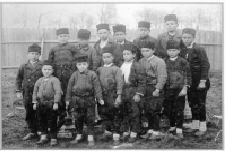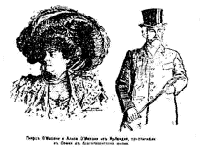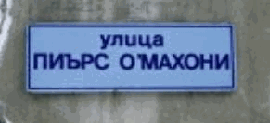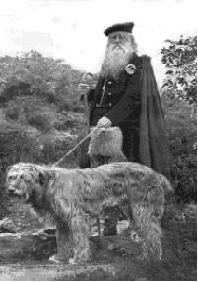By Maria Spassova and Sťamus Shortall
______________________________________________________________
Introduction by Tony Mallen.
Please note that Pierce O'Mahony mentioned in this article was the second last "The O'Mahony of Kerry " who resided at Grangecon Demesne and he used to have a piper to pipe him into the Catholic Church at Grangecon. He gave up smoking as it stained his beard. He voted against conscription of Irish men during the 1914-18 War. The Bulgarian Agricultural Student mentioned was an IVANOV and his descendants are prominent in Arklow. Ivanov did at one time manage the O'Mahony holdings near Aughrim/Glenmalure. I once played GAA under 16 football in 1953 against an Ivanov of Arklow and he must have been almost two metres tall like† the Slav men we have here in WA. I am chuffed to have gotten to this article. The photo of the Chief is not quite as good as one in a Capuchin Annual of around 1948.
† † † † † † † †Cheers Tony Mallen
_______________________________________________________________
Sťamus Shortall Writes:
It was on a skiing trip in Bulgaria that my Bulgarian friends first asked me what I knew about 'The O'Mahoni', the great Irish benefactor of Bulgaria at the turn of the century. They were very surprised when I said that I had never heard of him & suggested that maybe he was British or Irish-American. Some time later, we decided to write a book and they asked me to research further here in Ireland.
The first task was to establish if he existed and what his full name was. Knowing the date of death (1930), the National Archives was the first port of call & within minutes I had found an entry in the probate register which I felt certain was him: "Pierce Charles de Lacy O'Mahony, The O'Mahony of Kerry".
Subsequent research has been through the National Library and the personal papers of the many people whose lives he touched. Luckily, in 1990's Ireland ,it is still possible to telephone a complete stranger and get invited around for tea!
Born in 1850 to a wealthy, landowner barrister in Kilmorna in County Kerry. Pierce O'Mahony inherited the liberal views of his grandfather, who was Daniel O'Connell's solicitor and also a great love of botany. His first public office was as Assistant Land Commissioner. In 1886 he was elected MP for North Meath as a member of Parnell's Irish Party. He supported Parnell during 'The Split' and paid for this in 1892, losing his seat to Michael Davitt.
It was in December 1903 that Pierce and his second wife, Alice Jane went to Bulgaria with the intention of setting up an orphanage for the refugee orphan of the St Ilynden's Day uprising against the Turks that had taken place earlier that year. This seems to have been a carefully planned exercise as he first visited the head of the Bulgarian Orthodox church in Constantinople to gain support and then shortly afterwards issued a statute for the orphanage, in both Bulgarian and French, setting out the way in which it would be run and appointing leading social, political and religious figures in Bulgaria to run it. He personally visited the distressed parts of Bulgaria to select the candidates who would be housed and educated in the orphanage. In 1905, the Bulgarian, Boris Manduschev wrote a book describing the expedition.
The orphanage was opened on March 30 1904; Ferdinand I of Bulgaria was represented by his secretary, Dubrovitch, who brought a proclamation of support.
From representations made by Pierce to Ferdinand, it is clear that he took a direct interest in the welfare of the boys and indeed, for many years afterwards, the orphans adopted the name 'Mahoni' to honour him. At least four of the brightest orphans were brought to Ireland to further their education. One completed agriculture at Albert College in Dublin, his descendants have a farm in Wicklow. Another, did medicine in Trinity and had a very successful career around the world before returning to Bulgaria to live out his last days. In 1987, this orphan, Atanas Blagoev Filipov, was quoted in a Bulgarian newspaper as saying of O'Mahony:
† 'we considered him as our father'.
In 1907, the Irish Crown Jewels disappeared from the Genealogical Office in Dublin Castle. Pierce's half-brother, Sir Arthur Vicars, was Ulster King at Arms & in charge of the jewels. The jewels were never recovered and Vicars was accused of negligence. Pierce defended him by writing to the government and arguing that Vicars had never been paid to protect the jewels.
In 1911, Pierce sponsored a botanical expedition, which included Charles Frederick Ball, Assistant Keeper of the Royal Botanical Gardens in Glasnevin. An account of this was published in the journal of the Royal Horticultural Society.
It is not clear exactly when Pierce decided to finish his activities in Bulgaria. From a letter that I have seen among John Redmond's papers in the National Manuscripts collection, I gain the impression that he took a specific number of orphans, 30, in 1904 and pledged to educate them so, to quote him, 'they might be a credit to their country'. In 1915 he received the 'Order of Civil Merit' from his friend, Ferdinand I, Czar of Bulgaria. Shortly after that, it is said that he had a strong disagreement with Ferdinand concerning Bulgaria's siding with Germany in the Great War and returned to Ireland.
On his return, Pierce worked with John Redmond, recruiting soldiers here to fight on the allied side. For this, he was awarded the CBE in 1920, but is said that he returned it in protest at British policy.
Even though he was no longer in Bulgaria, Pierce retained affection for the country. In 1915 he published a series of letters concerning super-power policy in the Balkans, many of the borders and states mentioned, being still relevant today. After the war, he argued that Bulgaria should be spared reparations.
In his 70's he spent much time cultivating exotic plants at his farm in Coolbalintaggert in Wicklow and having converted from Church of Ireland to Bulgarian Orthodox, died a Roman Catholic in 1930.



